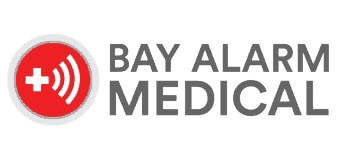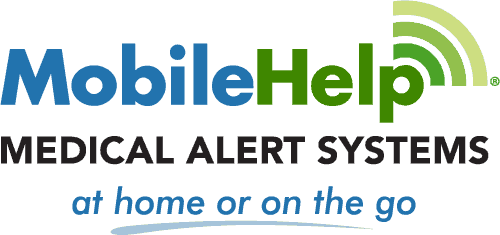The Best Medical Alert Systems for Blind Users, Tested by Caregivers
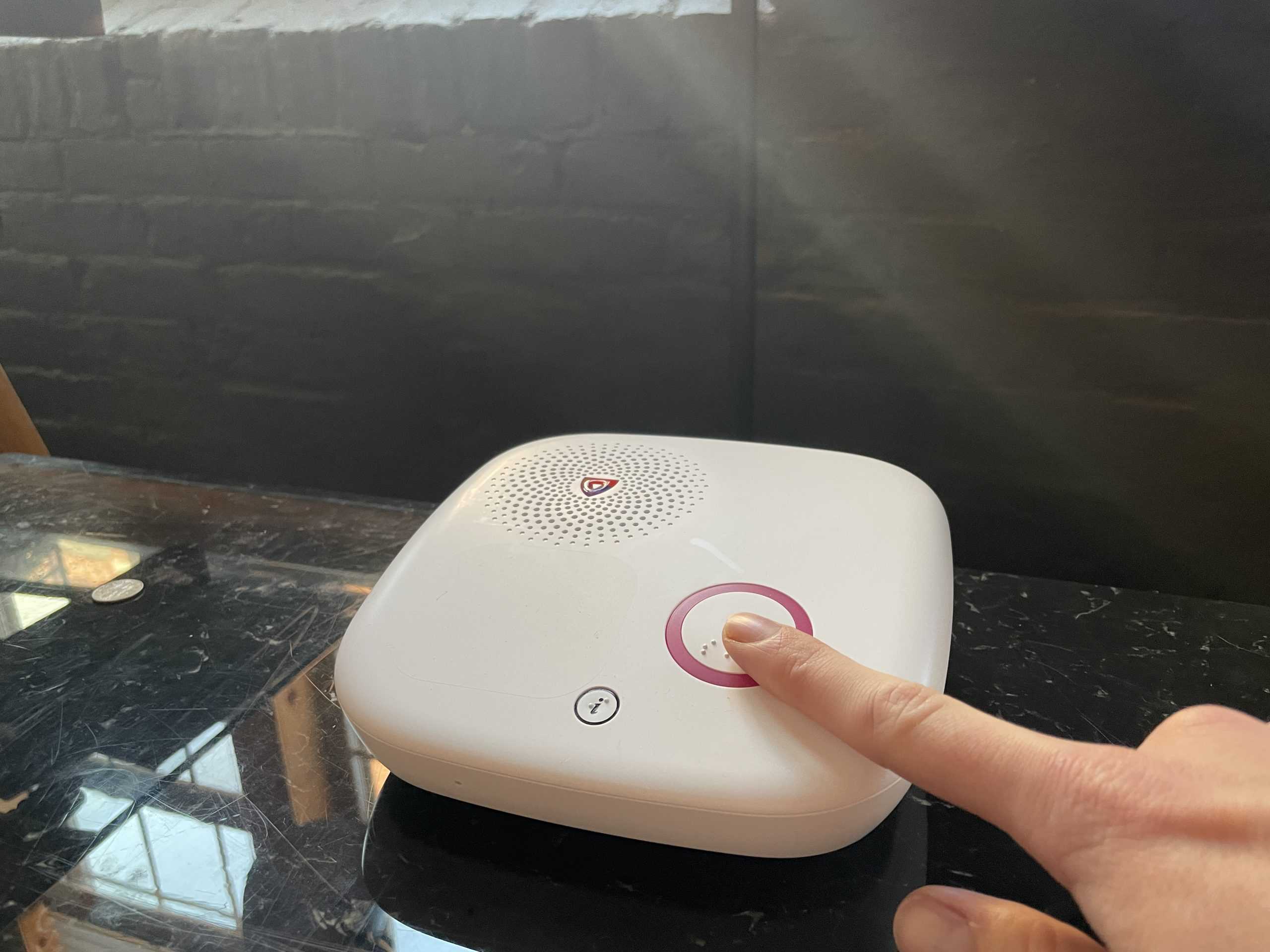
Key Findings
- Answering our ten calls in an average of eight seconds, Medical Guardian performed the best in our tests.
- Aloe Care Health systems allow caregivers to call a user’s system directly from a phone.
- Bay Alarm Medical offers high-performing systems for $24.95 per month, making them a great affordable option.

Why Trust TheSeniorList?
At TheSeniorList, our team of caregivers, experts, and healthcare professionals conducted over 5,000 hours of in-depth research and testing to recommend the most reliable brands and devices. In this process, our team:
- Tested 50 medical alert devices from 15 different brands.
- Surveyed 1,250 seniors and caregivers on medical alert system usage.
- Consulted with nurses, EMTs, and caregivers who are experts at caring for older adults.
- Published dozens of videos that demonstrate our medical alert system testing.
- Evaluated verified customer reviews of medical alert companies from the Better Business Bureau.
How We Test Medical Alert Systems
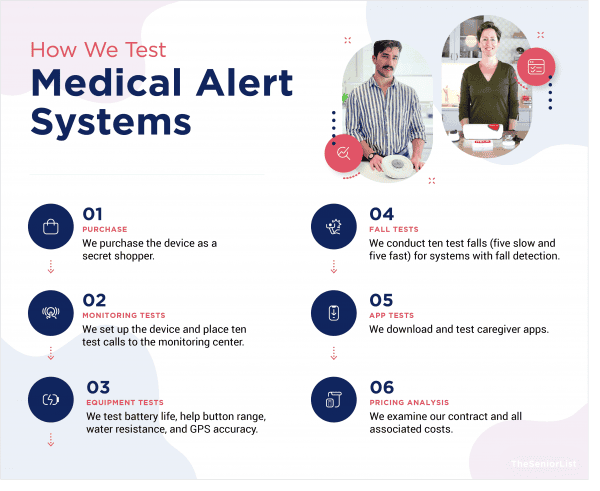
While there are no medical alert systems made specifically for blind users, we evaluated systems on the following criteria:
- Durable equipment: We looked for companies that provided reliable equipment that would perform in moments of crisis. All of the providers on this list feature water-resistant or waterproof devices that can also withstand falls.
- Activity monitoring: Through motion sensors and accelerometers, medical alert systems can notify loved ones in the event of an extended period of inactivity. This feature is especially useful for loved ones who can’t always be around.
- Location tracking: For more active users who wish to take their system on the go, it’s important that a system have built-in GPS. This way, in the event of an emergency, their system can report a location to first responders.
- Fall detection: A must-have for any medical alert system, fall detection can automatically sense when a user has fallen and contact response agents without the user having to press a button.
- Quick response times: Medical alert systems, in essence, are a direct line of communication to trained response agents. Since every company has its own specific call centers, we make sure to test how quickly they pick up the phone.
FYI: These systems are useful for blind users; however, they’re not the most affordable. To find medical alerts from $24.99 per month, read our guide to this year’s best medical alert systems.
Our Top Picks
- Bay Alarm Medical : Best Battery Life
- Medical Guardian : Fastest Response Times
- Aloe Care Health : Best Caregiver Tracking
- MobileHelp : Best Budget Option
- UnaliWear Kanega Watch : Best With Fall Detection
1. Bay Alarm Medical - Best Battery Life
What We Like Most:
- Six days of power from one charge
- Caregiver tracking through the Bay Alarm Medical app
- Monthly fees start at $35
- Optional fall detection
Overview
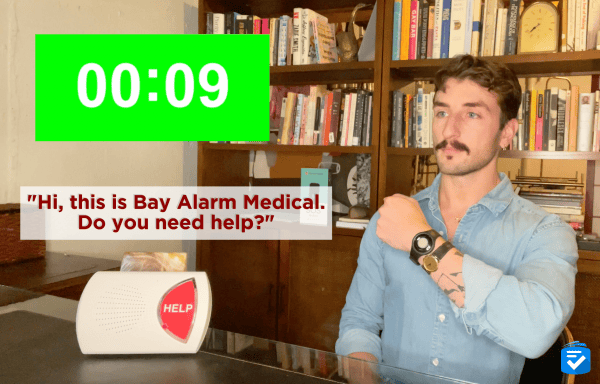
With an average response time of 16 seconds and a battery that lasts up to six days, Bay Alarm Medical blew us away with the strength of its devices.
Standout Features
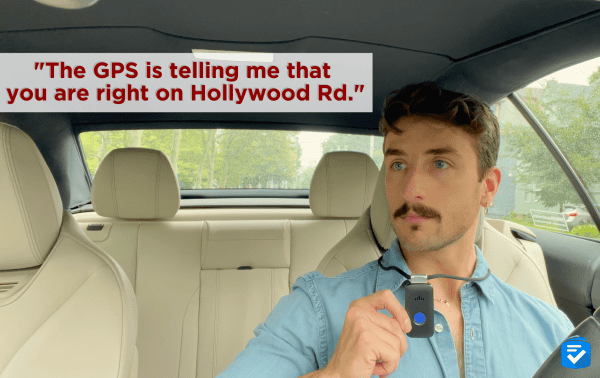
Bay Alarm Medical offers a variety of straightforward equipment, from a smartwatch to in-home systems, for affordable prices starting at just $19.95 per month. We recommend the SOS Mobile, a medical alert button that you can wear everywhere and anywhere, unlike the Essentials package from Aloe Care Health.
>>Read more: SOS Smartwatch Review
Wearable on either a belt clip or a neck lanyard, the pendant impressed us with its six-day battery life from a single charge. We wore it all the time, save for the few hours we spent charging it. We even wore it in the shower, as the device has an IP rating of 67, making it water-resistant. And in further contrast with Aloe’s Essentials package, fall detection is optional with the SOS Mobile, and it doesn’t require an additional device. That means that a blind user won’t have to search for a button after taking a nasty fall.
Pricing
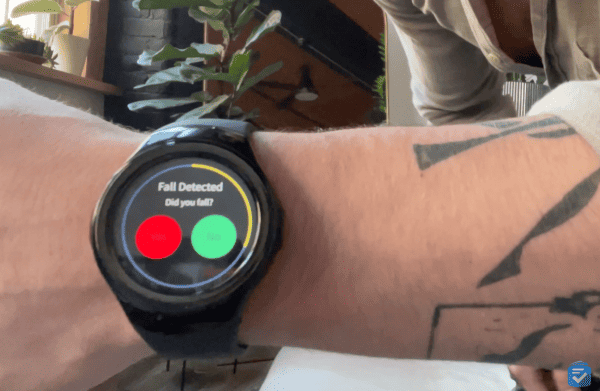
We paid $99 for the SOS Mobile itself, which was cheaper than all but the MobileHelp Duo, which required no upfront equipment cost. But beyond that, monthly costs range from $19.95 to $59.95 (fall detection costs an extra $10 per month.) The highest-tier package, the SOS Mobile 360° Bundle, tacks on an in-home device for even more protection. No matter which package you choose, there are no activation fees. In sum? Bay Alarm offers the lowest monthly prices of any company on this list.
>>Read more: Bay Alarm Medical Costs
Drawbacks
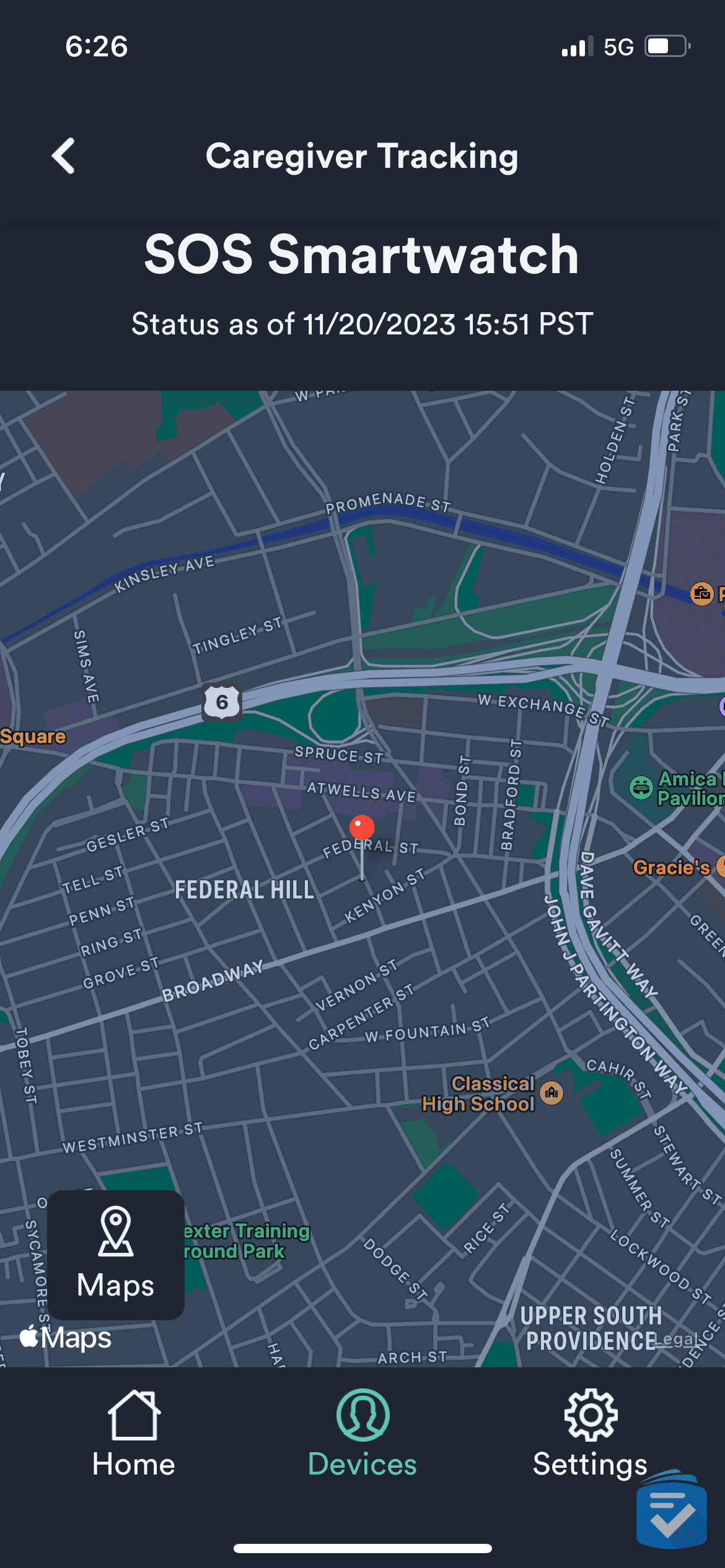
Although we appreciated the caregiver tracking available in the Bay Alarm Medical app, which included seeing the location and device battery level, the iOS and Android apps were buggy at best. Testing it on our iPhone, we noticed that the GPS tracking was very off and there were no alerts when the device’s battery was low. Other customers seem to agree with us, as the app has a 2.9-star rating (out of 5) on the Apple App Store and a 1.9-star rating (out of 5) on Google Play. For a better app, check out Aloe Care Health’s, rated at 3.8 and 3.5, respectively.
Our Verdict
Though the app may not be the friendliest to users, the SOS Mobile is both functional and affordable, in or outside of the home. To learn more about our experience with this system, read our full Bay Alarm Medical review.
Pros
- Six-day battery life
- Fall detection that doesn’t require another device
- Water-resistant IP rating
- Monthly contracts
Cons
- Poorly rated iPhone and Android apps
- Water-resistant but not waterproof
2. Medical Guardian - Fastest Response Times
What We Like Most:
- Tracking of location, battery, system status, and connectivity
- Battery life of up to three days
- Step and activity tracking
- Wearable watch design
Overview
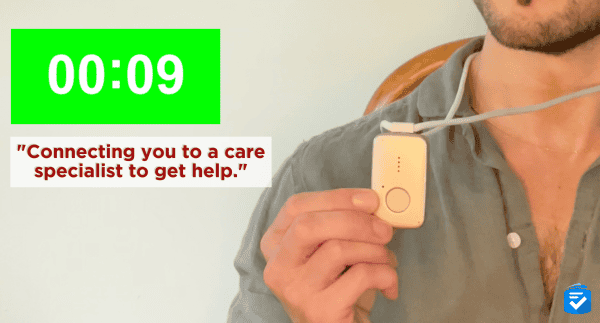
Of all the devices we tested, Medical Guardian had the fastest response times, averaging eight seconds across our test calls. Additionally, Medical Guardian offers comprehensive tracking through the MyGuardian app, so you’ll be able to see exactly how your loved one is faring with their device.
Standout Features
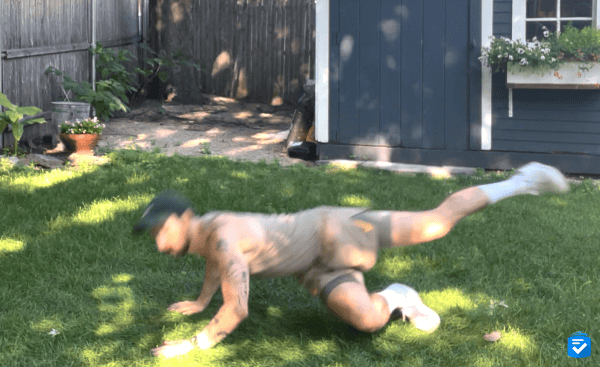
Generally, we love the eight-second response time of Medical Guardian, one of the fastest we’ve seen in all of our testing. For blind people, we recommend the MGMini Lite, a mobile medical alert with a battery life of up to three days. Not only does it track the user’s location, but it also tracks their steps and activity levels, allowing for a more comprehensive check-in from caregivers. The MGMini Lite is water-resistant — with an IP rating of 67. That rating means users can wear it in the shower, and the device will remain fully functional. Because it takes only three hours to charge, you’ll be able to wear it for days on end without needing to take it off.
>>Read more: MGMini Lite Review
While fall detection is not included with the MGMini Lite, we like that it’s available as an add-on for $10 more per month, which is standard across the industry. While we wish fall detection was included, like with the Kanega Watch, some systems would require a separate device for fall detection, like with MobileHelp Duo. That’s not the case for the MGMini Lite, which has fall detection built into the device. That feature is important for blind users in particular, as they may have trouble finding the button in the event of a fall.
Pricing
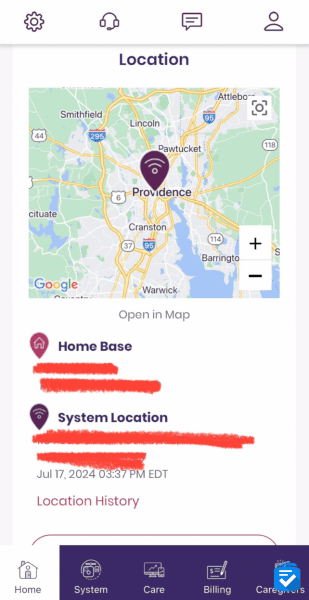
The MGMini Lite costs $149.95, and the monthly fee is $46.95. If you added fall detection, those prices would go up to $56.95 per month, which is higher than average for a mobile system.
>>Read more: Medical Guardian Pricing Guide
Drawbacks
While the three-day battery life of the MGMini Lite is impressive, it’s about half of the battery life of the Kanega Watch, which lasts a whopping six days. Plus, we wish fall detection was included in the price, as it is with the Kanega Watch.
Our Verdict
The MGMini Lite is an affordable and subtle way to stay safe, no matter where you are. We recommend springing for fall detection, as it could be life-saving for a blind user.
To learn more about this company, read our full Medical Guardian review.
Pros
- MyMedicalGuardian app caregiver tracking
- Tracking of activity and steps
- IP67 rating
- Adjustable band
Cons
- Fall detection is $10 more per month
- Requires regular charging
3. Aloe Care Health - Best Caregiver Tracking

What We Like Most:
- Three-year battery life
- No long-term contract
- Senses air quality, motion, and temperature
- Highly rated Aloe Care Health app
Overview
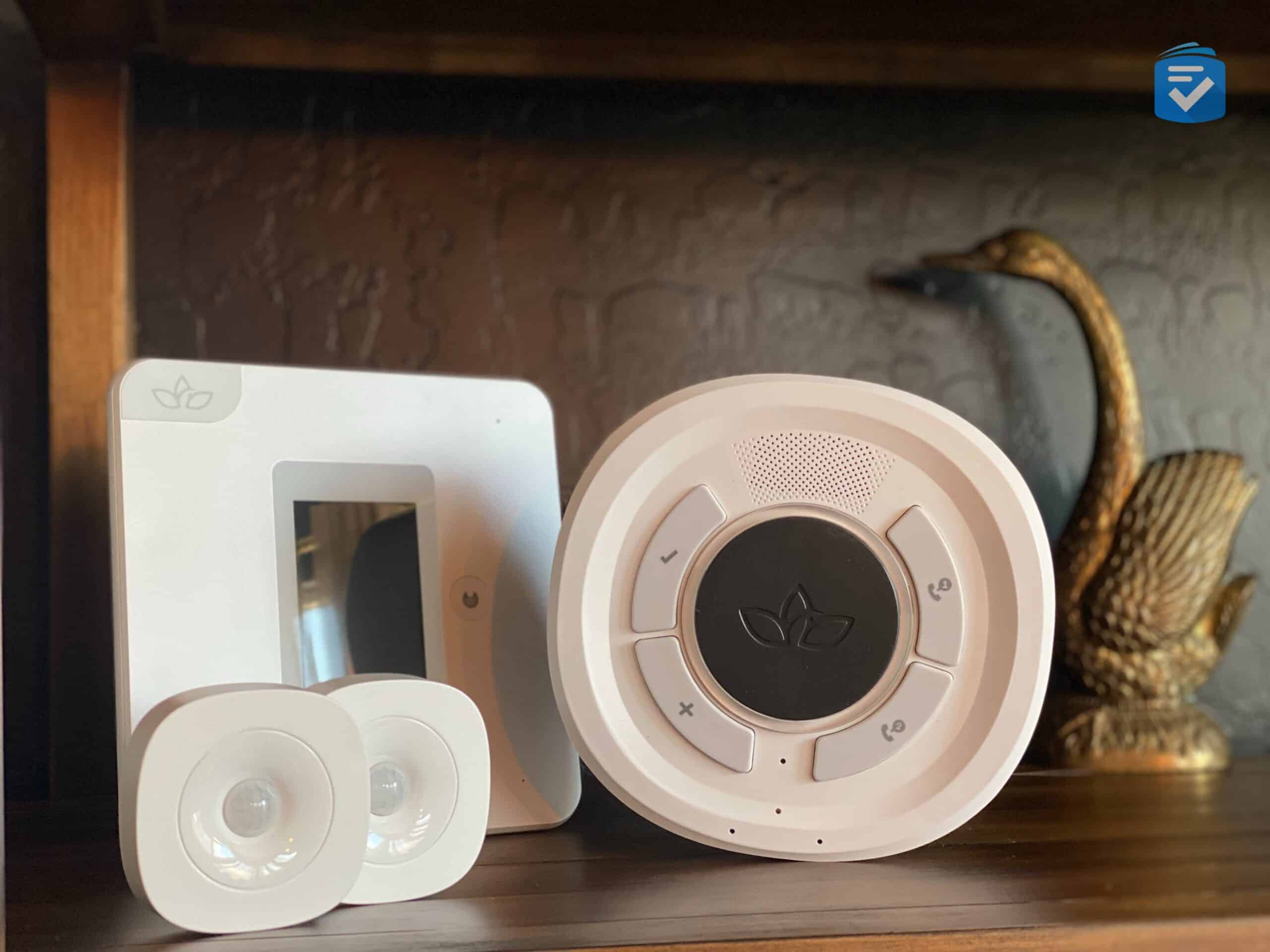
Aloe Care offers three medical alert systems with both home and on-the-go devices. But no matter which system you choose, you won’t have to commit for long, as all contracts are month-to-month.
Standout Features
We like the medical alert systems from Aloe Care due to its excellent customer service, response time of only eight seconds, and intuitive caregiver features. While there are three packages available, Essentials, the Mobile Companion 2, and Essentials Plus, we recommend Essentials, which consists of a smart home hub and a care button, which we wore as a bracelet.
Note that this system works only within the home, so you may want to pair it with a mobile medical alert system if the user wants protection while they’re out and about. However, within the home, the hub works with the bracelet, which has a range of 200 feet. The battery life on the bracelet is the longest we’ve ever seen at three years, but of course, that’s easier with this short of range. Still, the system provides protection within the home, and the hub can also sense temperature, air quality, and motion. While the system does not have fall detection, you can check in on the user via the Aloe Care Health app. For example, if you see that their apartment is at 90 degrees and that they haven’t moved all day, there may be an issue.
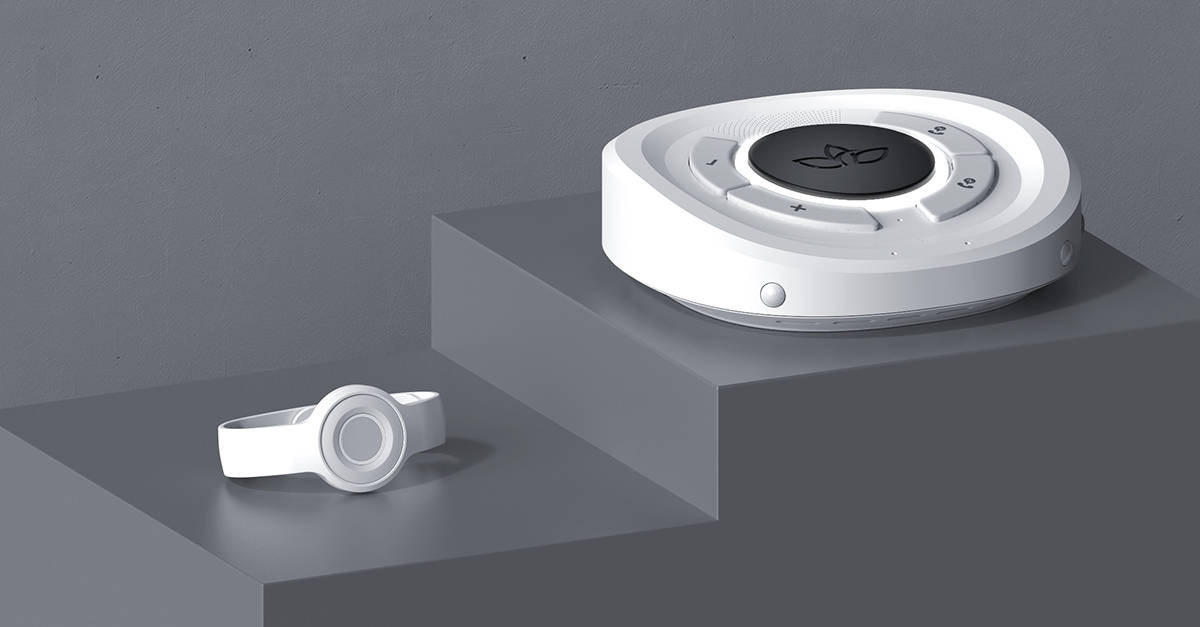
Pricing
We paid $199 for the Essentials package and an additional $39.99 per month for emergency help and app usage. The other two packages, the Mobile Companion 2 and the Essentials Plus, cost $44.99 and $59.99 per month, respectively. These monthly prices are average, and all contracts were monthly, allowing for some flexibility.
Drawbacks
Fall detection isn’t an option with the Essentials package. However, if that’s something you definitely want in your medical alert system, you’ll have to spring for the more expensive Mobile Companion 2 or the Essentials Plus, which cost $149.99 and $349.99, respectively. Additionally, the Essentials package is not covered by a warranty, which is very unusual.
Our Verdict
If you’re looking for protection within the home only, the Essentials package is an affordable way to get there, with mobile tracking through the Aloe Care Health app.
Pros
- User-friendly Android and iOS apps
- Monthly contracts
- Water-resistant
- Sensing of motion, air quality, and temperature
Cons
- Essentials package does not include fall detection
- No warranty
4. MobileHelp - Best Budget Option
What We Like Most:
- In-home and out-of-home devices
- Medication reminders
- Activity tracking
- No charge for equipment
Overview
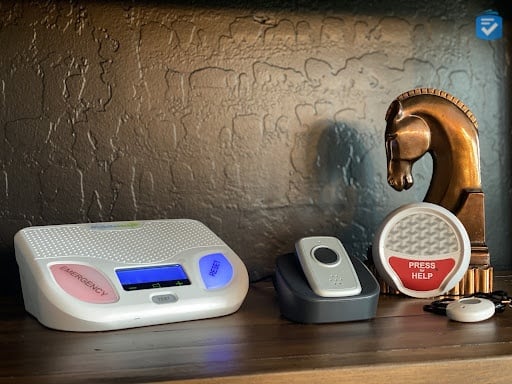
With three at-home systems, two portable systems, and three bundles, there’s a lot to choose from when you’re shopping at MobileHelp. Best of all, its systems start at $19.99 per month.
Standout Features
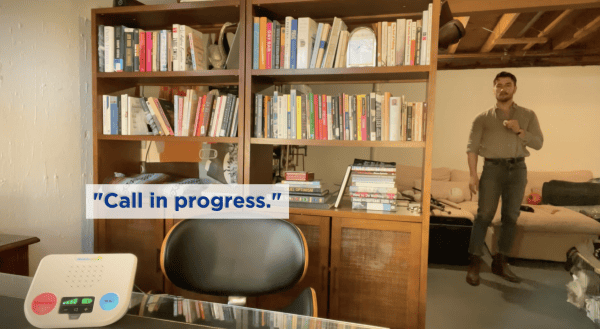
One of the reasons we like MobileHelp as a company is because of the MobileHelp Connect app. Using this app, caregivers can see not only the device’s location, battery level, and system status, but also how active the user was on a certain day. Beyond that, they can set medication reminders and make updates in the app directly. Medication management is one of many hurdles that blind people face, according to the American Foundation for the Blind, so having automated reminders could be a huge help.
Although MobileHelp isn’t short on options (unlike Kanega, whose Kanega Watch is the company’s only offering), we recommend the MobileHelp Duo for blind users. Why? Because it includes both an in-home base unit, a mobile unit, and a waterproof help button — all for free. Of course, we paid a monthly fee, but you can’t get much better than free equipment. Since we saved so much money on equipment, we added a fall detection button for $11 per month. It would be nice if fall detection didn’t require a separate device, but considering how much we saved, we weren’t too mad about it, nor were we ever short on devices.
Pricing
Like we said, we didn’t pay anything upfront for the MobileHelp equipment. Rather, we paid anywhere from $41.95 to $46.95 per month for the monitoring and cellular network that kept us connected to the monitoring center, plus $11 more per month for the fall detection button. Contracts are either monthly, quarterly, semiannual, or annual, and the prices go down the longer commitment you make. There are no activation fees, making MobileHelp a decidedly affordable option.
>>Read more: MobileHelp Pricing Guide
Drawbacks
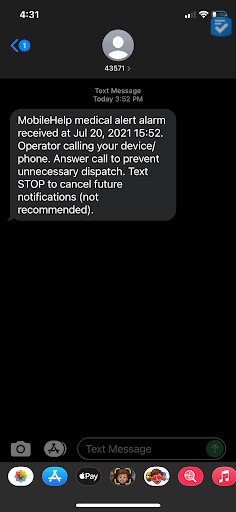
While we had few issues with the Android MobileHelp Connect app, the iOS app left much to be desired. We found that the app was basically a poorly formatted version of the website, with words cut off and pages cut in half. To access the caregiver tracking, we preferred to use the website, which wasn’t a great experience on mobile. And with a 1.5-star rating in the Apple App Store, we weren’t alone in our disappointment.
Our Verdict
For protection at home, outside of the home, and even in the shower, MobileHelp offers a variety of options with completely free equipment.
To learn more about our experience with this brand, read our full MobileHelp review.
Pros
- No equipment fees
- At home and on-the-go devices
- Activity tracking
- Waterproof help button
Cons
- Poor iOS app
- Fall detection costs $11 more per month and requires a separate device
5. UnaliWear Kanega Watch - Best With Fall Detection
 View Packages
Links to UnaliWear Kanega Watch
View Packages
Links to UnaliWear Kanega Watch
What We Like Most:
- No equipment fees
- Fall detection included
- Four rechargeable batteries
- Waterproof design

Overview
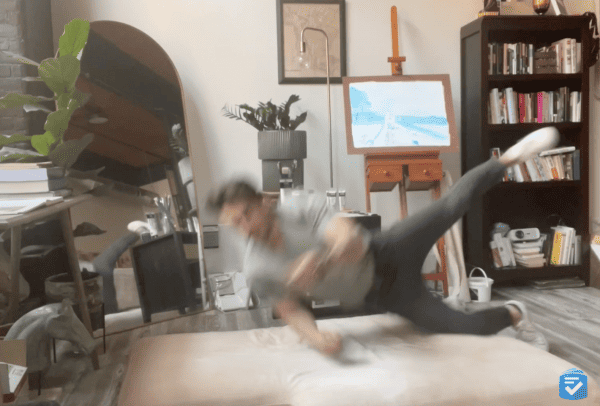
Many seniors want to hide the fact that they are wearing a medical alert device; one solution to that problem is a smartwatch. Meet the Kanega Watch from UnaliWear, the company’s sole offering, which has fall detection built in and is included in the price.
Standout Features
The Kanega Watch is a durable, waterproof watch that we could wear anywhere, both in and out of the shower. With four rechargeable batteries included, we didn’t have to spend any time without our watch on. Rather, we could just swap the battery out and put in a new one. The package also comes with two chargers, ensuring that we never run out of juice.
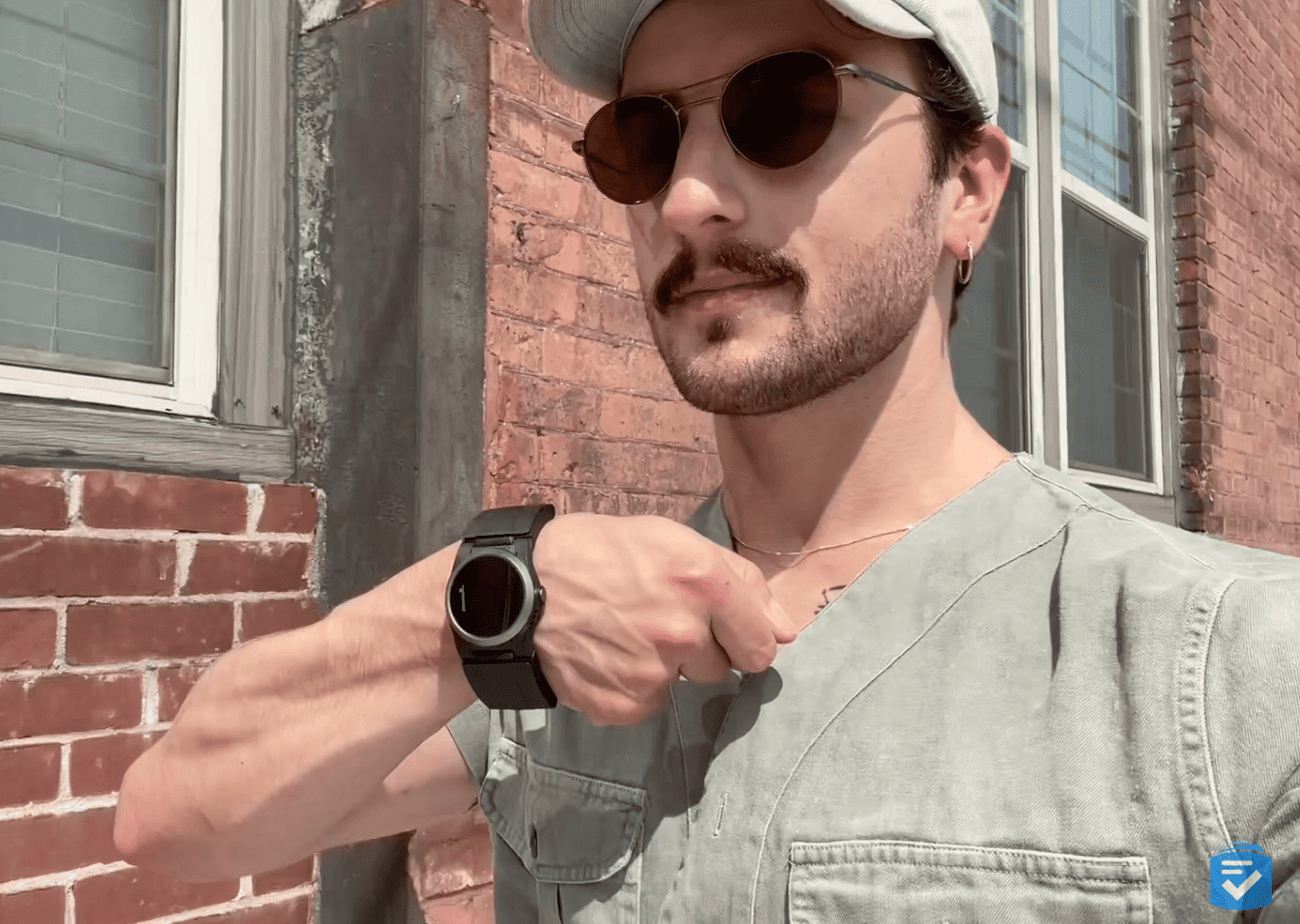
One of the features of the Kanega Watch that makes it stand out the most is the fact that fall detection is included in the monthly cost. When we tested out the watch and tripped on the sidewalk, the watch asked us if it detected a fall. Even if we didn’t answer, someone at the monitoring center would have been alerted and dispatched emergency services. And what’s cool about the fall detection on the Kanega Watch is its lack of false alerts. According to UnaliWear, the company collects data from actual falls from all of its watches. The more data it has, the more accurate the patented software is, reducing false alerts. So, the next time you sit down fast in a chair, you won’t have to hear an annoying voice asking if you need help.
Pricing
Technically, like the MobileHelp Duo, the Kanega Watch does not require any equipment fees. However, while MobileHelp doesn’t charge any activation fees, UnaliWear charges either $199 if you commit for a year or $299 if you commit for a month. Beyond that, the annual subscription breaks down to $59.95 per month, or a one-time payment of $719.40, while the monthly option is $69.95. These are the highest monthly and activation fees of any device on this list by a pretty wide margin. But there is a small silver lining: AARP members and veterans get one month free.
Drawbacks
The main drawback of the Kanega Watch is mainly its high monthly and activation fees. Additionally, we wish UnaliWear offered more products than just the Kanega Watch, such as a medical alert pendant or an in-home unit. However, this is to be expected from a company that started from a Kickstarter in 2015. Hopefully, the company will expand its offerings to rival more established companies like Medical Guardian and MobileHelp.
Our Verdict
If you want the more accurate fall detection strapped to your wrist at all times, the Kanega Watch is worth the money. To learn more about our experience with this system, read our full Kanega Watch review.
Pros
- Data-driven fall detection included
- Four rechargeable batteries and two chargers
- Waterproof durability
- Free month for veterans and AARP members
Cons
- High activation and monthly fees
- Only one system available
How To Choose a Medical Alert for a Blind User
When looking to purchase a medical alert system for a blind or visually impaired person, you should look for the following:
Large Buttons
Check the base unit on the system you’re considering. Most medical alert systems worth their salt have large, oversized buttons for easy use. Additionally, textured buttons and bright colors can help those with limited eyesight.
If in doubt, we recommend calling the medical alert company and asking some questions. Any good medical alert service will be delighted to help, and you’ll get a taste of its customer service too.
Think carefully about wearable buttons. The wearable button is vital because it ensures seniors can summon help even when it’s not near the base station. Make sure the button is large enough to find and press easily, and that it’s comfortable enough to wear all the time.
Caregiver Tracking
The best medical alert systems let caregivers track their loved ones through either a web portal or a mobile application available for iPhones and Android devices. Take the MyMedicalGuardian app, for instance. Not only did it let us track the wearer’s location, but it also told us about the MGMini Lite’s battery history, system status (whether it was on or off), and connectivity history. That gave us peace of mind that the system was up and running.
Beyond that, some caregiver tracking lets you see the wear’s daily activity levels as well as the weather where they are, giving you even more information. If you notice that there is a hailstorm in their area or that their activity level is low, you can reach out through the device itself. Some apps even let you chat with other caregivers with access, as two heads are better than one.
Voice Commands
Some medical alert systems offer voice commands, an ideal feature for those who don’t want to wear a device. For example, systems from Aloe Care Health allow a user to place an emergency call solely by using their voice. This is ideal for someone who doesn’t want to wear a physical device 24/7, especially as they’re lounging around the house. Unfortunately, none of the devices on this list has voice commands, as they’re a rarity in medical alert systems. That being said, we hope that this changes in the future, as voice commands would be incredibly helpful for someone who is blind or visually impaired.

Integrated Fall Detection
Medical alert systems with fall detection are a great tool to keep people safe. Although fall detection isn’t perfect and false alarms do happen, we still recommend it, as it helps more often than it hinders, and medical alert providers are used to the occasional false alarm.
For visually impaired seniors, trying to distinguish between their medical alert and the fall detection pendant could lead to a delay in pressing the button to get help.
For some companies, fall detection comes as a separate pendant that must be worn alongside the existing alert button. For seniors who are visually impaired, we recommend looking for an integrated fall detection option, like that of the Lively Mobile2.
This means the existing medical alert button has fall detection capabilities that can be activated for a fee, with no need to wear a second pendant.
All-in-One Mobile Units
Medical alerts with GPS work outside the home, using a cellular network. These are ideal for seniors who still live active lifestyles but who would like some added protection throughout their day. Some GPS alerts feature the mobile device itself, plus a separate button to wear to summon help. The user and operator then talk via the two-way speaker in the mobile device.
With two-way voice-integrated pendants, everything is in one unit. In the event of an emergency, seniors simply press their button and then talk to the call center via the same device.
GPS voice-in-pendants are ideal for active seniors who are visually impaired. However, in some cases, they are appropriate for less active seniors too. The two-way speaker function means they can carry it with them wherever they go in the home or garden. This can offer aging adults great peace of mind in knowing that they can always talk to someone without the need to be in the range of a base station.
Month-to-Month Contracts
Most medical alert companies don’t require you to purchase their equipment; rather, the equipment is leased through your monthly service agreement. Because of this, we always recommend medical alert companies that don’t lock you into a long-term contract.
Additionally, you could consider an unmonitored medical alert system.
Bottom Line
Both vision loss and blindness become more widespread with age, vision loss in particular. By ages 75 to 79, 8 percent of U.S. adults will have experienced vision loss, and that number goes up to 21 percent for those 85 and older, according to CDC data. For blindness, those numbers are 1 percent and 6 percent, respectively. Medical alert systems are a great way to help blind people stay independent and safe at the same time.


